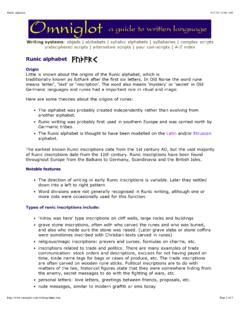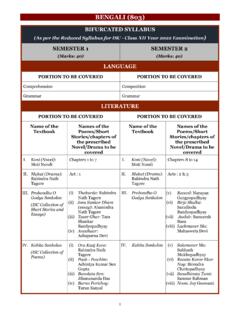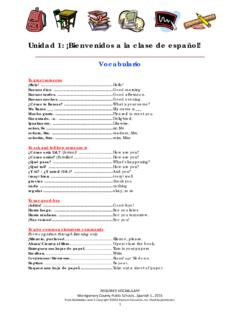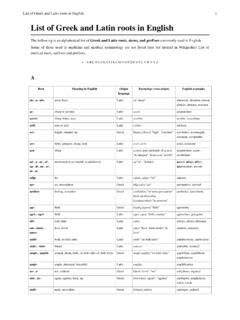Transcription of The African Writer and the English Language
1 The African Writer and the English Language Chinua Achebe IN JUNE 1962, there was a writers' gathering at Makerere, impressively styled: "A Conference of African Writers of English Expression." Despite this sonorous and rather solemn title, it turned out to be a very lively affair and a very exciting and useful experience for many of us. But there was something which we tried to do and failed that was to define " African literature" satisfactorily. Was it literature produced in Africa or about Africa? Could African literature be on any subject, or must it have an African theme? Should it embrace the whole continent or south of the Sahara, or just black Africa? And then the question of Language .
2 Should it be in indigenous African languages or should it include Arabic, English , French, Portuguese, Afrikaans, and so on? In the end we gave up trying to find an answer, partly I should admit on my own instigation. Perhaps we should not have given up so easily. It seems to me from some of the things have since heard and read that we may have given the impression of not knowing what we were doing, or worse, not daring to look too closely at it. A Nigerian critic, Obi Wali, writing in Transition 10 said: "Perhaps the most important achievement of the conference .. is that African literature as now defined and understood leads nowhere." I am sure that Obi Wali must have felt triumphantly vindicated when he saw the report of a different kind of conference held later at Fourah Bay to discuss African literature and the university curriculum.
3 This conference produced a tentative definition of African literature as follows: "Creative writing in which an African setting is authentically handled or to which experiences originating in Africa are integral." We are told specifically that Conrad's Heart of Darkness qualifies as African literature while Graham Greene's Heart of the Matter fails because it could have been set anywhere outside Africa. A number of interesting speculations issue from this definition, which admittedly is only an interim formulation designed to produce an indisputably desirable end, namely, to introduce African students to literature set in their environment.
4 But I could not help being amused by the curious circumstance in which Conrad, a Pole, writing in English could produce African literature while Peter Abrahams would be ineligible should he write a novel based on his experiences in the West Indies. What all this suggests to me is that you cannot cram African literature into a small, neat definition. I do not see African literature as one unit but as a group of associated units in fact the sum total of all the national and ethnic literatures of Africa. A national literature is one that takes the whole nation for its province and has a realized or potential audience throughout its territory. In other words, a literature that is written in the national Language .
5 An ethnic literature is one which is available only to one ethnic group within the nation. If you take Nigeria as an example, the national literature, as I see it, is the literature written in English ; and the ethnic literatures are in Hausa, Ibo, Yoruba, Efik, Edo, Ijaw, etc., etc. Any attempt to define African literature in terms which overlook the complexities of the African scene at the material time is doomed to failure. After the elimination of white rule shall have been completed, the single most important fact in Africa in the second half of the twentieth century will appear to be the rise of individual nation-states. I believe that African literature will follow the same pattern.
6 What we tend to do today is to think of African literature as a newborn infant. But in fact what we have is a whole generation of newborn infants. Of course, if you only look cursorily, one infant is pretty much like another; but in reality each is already set on its own separate journey. Of course, you may group them together on the basis of anything you choose the color of their hair, for instance. Or you may group them together on the basis of the Language they will speak or the religion of their fathers. Those would all be valid distinctions, but they could not begin to account fully for each individual person carrying, as it were, his own little, unique lodestar of genes.
7 Those who in talking about African literature want to exclude North Africa because it belongs to a different tradition surely do not suggest that black Africa is anything like homogeneous. What does Shabaan Robert have in common with Christopher Okigbo or Awoonor-Williams? Or Mongo Beti of Cameroun and Paris with Nzekwu of Nigeria? What does the champagne-drinking upper-class Creole society described by Easmon of Sierra Leone have in common with the rural folk and fishermen of J. P. Clark's plays? Of course, some of these differences could be accounted for on individual rather than national grounds, but a good deal of it is also environmental. I have indicated somewhat offhandedly that the national literature of Nigeria and of many other countries of Africa is, or will be, written in English .
8 This may sound like a controversial statement, but it isn't. All I have done has been to look at the reality of present-day Africa. This "reality" may change as a result of deliberate, , political, action. If it does, an entirely new situation will arise, and there will be plenty of time to examine it. At present it may be more profitable to look at the scene as it is. What are the factors which have conspired to place English in the position of national Language in many parts of Africa? Quite simply the reason is that these nations were created in the first place by the intervention of the British, which, I hasten to add, is not saying that the peoples comprising these nations were invented by the British.
9 The country which we know as Nigeria today began not so very long ago as the arbitrary creation of the British. It is true, as William Fagg says in his excellent new book, Nigerian Images, that this arbitrary action has proved as lucky in terms of African art history as any enterprise of the fortunate Princess of Serendip. And I believe that in political and economic terms too this arbitrary creation called Nigeria holds out great prospects. Yet the fact remains that Nigeria was created by the British for their own ends. Let us give the devil his due: colonialism in Africa disrupted many things, but it did create big political units where there were small, scattered ones before.
10 Nigeria had hundreds of autonomous communities ranging in size from the vast Fulani Empire founded by Usman dan Fodio in the north to tiny village entities in the east. Today it is one country. Of course there are areas of Africa where colonialism divided up a single ethnic group among two or even three powers. But on the whole it did bring together many peoples that had hitherto gone their several ways. And it gave them a Language with which to talk to one another. If it failed to give them a song, it at least gave them a tongue, for sighing. There are not many countries in Africa today where you could abolish the Language of the erstwhile colonial powers and still retain the facility for mutual communication.





